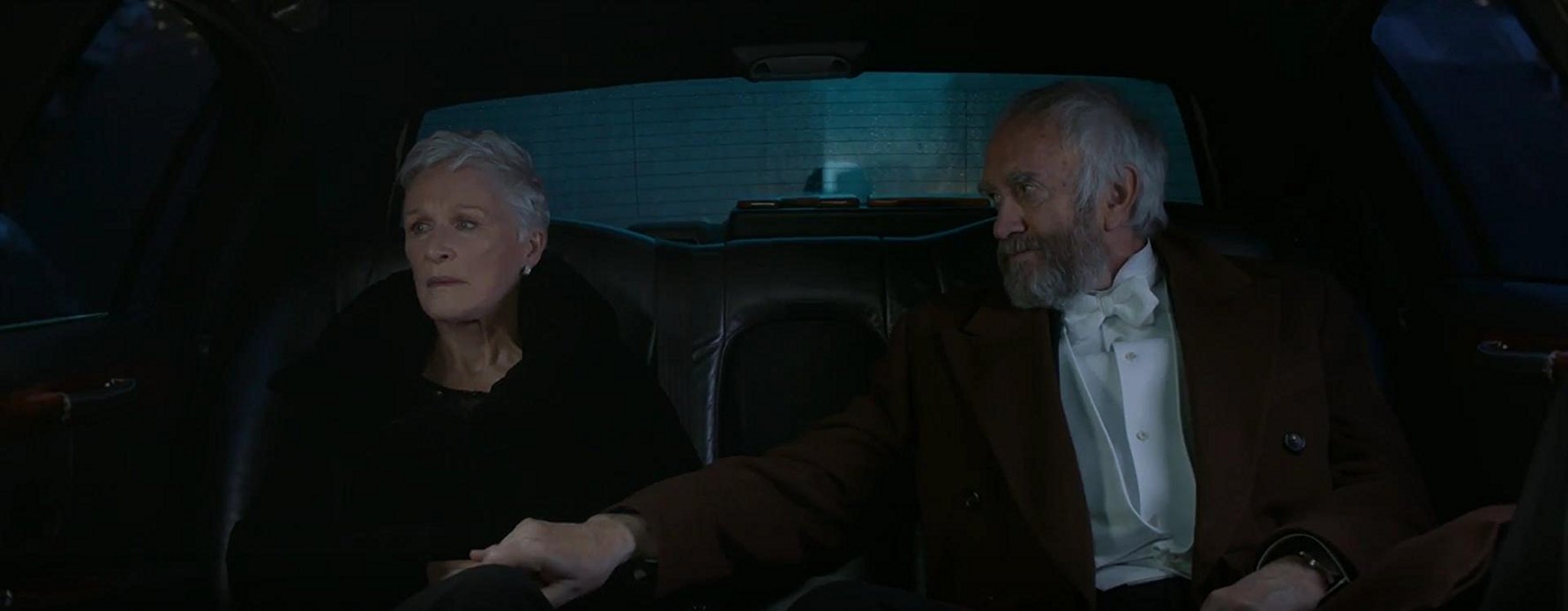Film can be a depressingly literal medium at times. Certain areas of human experience – religious faith, sex or, as in the case of The Wife, what goes on in a writer’s head – can feel opaque, ridiculous or simply fall flat. In recent years, there have been many well intentioned, but not particularly memorable films about writers as mythic as Ernest Hemingway, Sylvia Plath and Allen Ginsberg. These writers certainly weren’t shut-ins. And yet unless you are hanging out at some groovy film quiz, you might have have trouble remembering Hemingway and Gellhorn, Sylvia or Howl. Although the author in The Wife is a composite of Philip Roth/John Updike (arguably giving the filmmakers sufficient poetic license to keep things exciting), the end result is as unmemorable as these recent films about actual writers.
Set in 1992, for reasons never convincingly explained, Joe Castleman (Jonathan Pryce), who lives in a beautiful lakeside house in Connecticut with wife, Joan (Glenn Close), gets the call from the Nobel Prize Committee that he has won the big prize. Before the two fly off to Stockholm for the official ceremonies, his well heeled friends throw a party to celebrate. Quicker than you can say uber-text, the seething resentment between Joe and his wife, who abandoned a promising literary career in the early 60s, is made clear in a series of steadily escalating arguments. The bickering continues all the way on the flight to Stockholm and through the various social obligations and main ceremony itself. Relief from this passive-aggressive showboating is provided in flashbacks which trace how the marriage drifted from grand passion (Joe left his first wife for Joan, who was one of his writing students) into domestic ennui.
The Wife, adapted from the 2003 novel by Meg Wolitzer, is a well intentioned attempt to delineate the fragile, but still standing emotional infrastructure between a vain writer and his long suffering spouse who has splintered her id into the roles of gatekeeper, unpaid agent, parent, editor, lover patient enough to tolerate other lovers and all around self-aware doormat. As Joan, Glenn Close ably conveys anger, frustration, neglect, weariness and jealousy with the nuance and spontaneity we have come to expect from her. Jonathan Pryce complements her performance with equally bravura displays of false modesty, narcissism, moodiness, dogmatism and a facile charm that walks a thin line between flirtatiousness and lechery. As good as he is, Pryce is essentially riffing on a part that he played before in Alex Ross Perry’s 2014 Listen Up Philip, a far more complex (and funnier) film about the toll of being in a relationship with a Capital-A Artiste/Asshole.
Alas the premise of The Wife leaves little for the other cast members to work with. Max Irons has a thankless part as the son tentatively writing his own fiction, who feels ignored and patronised by his father. As the younger Castlemans, Harry Lloyd and Annie Maude Starke do their best in the schematic flashbacks, but lack the screen presence of Close or Pryce. Playing a smooth talking biographer-in-waiting, Christian Slater seems to be the only one actually having fun in this interminable talk fest.
The core problem with The Wife is that the script relies so heavily on its two powerhouse lead actors, there is little room for spontaneity. You don’t have to wonder what happened to the Castleman’s marriage, because they essentially spend the entire film telling you how it all went wrong. The film’s big revelation is about as subtle as a Trump tweet.
Given the number of producers getting name-checked in the opening credits, one wonders how much of Jane Anderson’s script was second guessed in the development process. Bjorn Runge’s direction is efficient, but what little style this film possesses owes much to Stockholm’s fairy tale locale and winter light.
Wolitzer’s book, which evolved around a fictional prize given out at Helsinki, was driven by its first person narrative. While the filmmakers may have felt a more naturalistic approach made for better drama, it does make very compelling cinema. Domestic strife and the life of the mind result in great films (Who’s Afraid of Virginia Woolf, The Shining and Barton Fink are proof of that or if you like Pryce, his turn as Lytton Strachey in 1993’s Carrington, is also worth revisiting), but The Wife is a mystifying example of how empty a film can feel when its sole reason for existing appears to be to get an actor a career Oscar.
Screenplay by Jane Anderson adapted from the novel by Meg Wolitzer.
Directed by Bjorn L. Runge. Starring Glenn Close, Jonathan Pryce, Max Irons, Christian Slater, Harry Lloyd and Annie Maude Starke.

Comments are closed, but trackbacks and pingbacks are open.